Following the forced demolition of four houses in Miaoli County’s Dapu Borough (大埔) on Thursday, protesters have staged several flash-mob protests in Miaoli and Taipei.
Around a dozen protesters turned up in front of President Ma Ying-jeou’s (馬英九) Chinese Nationalist Party (KMT) chairmanship election campaign headquarters in Taipei a little before 8pm last night, and began throwing eggs at the building while chanting, “You tear down the Dapu houses today, we will tear down the government tomorrow!”
By the time police arrived on the scene the egg-throwing had ended. Nevertheless, two protesters, Wang Chung-ming (王鐘銘) and Wu Hsueh-chan (吳學展), were detained and charged with violation of the Social Order Maintenance Act (社會秩序維護法).
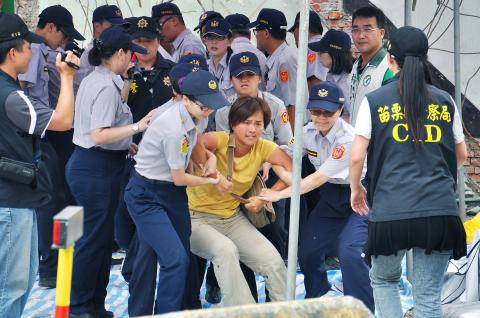
Photo: Peng Chien-li, Taipei Times
The police declined to say whether they had evidence proving the two’s involvement in the egg-throwing protest.
The pair were still at the police station as of press time.
About half an hour before the protest, a larger crowd demonstrated outside the KMT headquarters in Taipei and clashed with police as they threw eggs at the building.
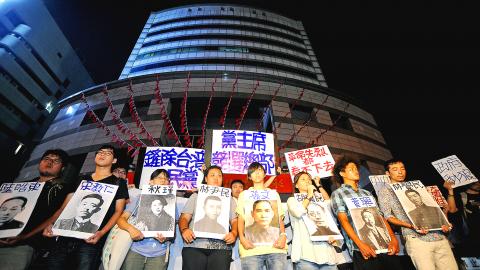
Photo: Liu Hsin-de, Taipei Times
Meanwhile, in Miaoli, four protesters staged a surprise protest outside Miaoli County Commissioner Liu Cheng-hung’s (劉政鴻) residence in Houlong Township (後龍) early yesterday morning.
“Rise up against the tyranny of Liu Cheng-hung that tore down the Dapu houses, Taiwanese!” The four shouted as they carried five large cans of yellow and white paint while running toward Liu’s house after arriving on scooters at around 6:20am.
Security guards outside the house scuffled with the four in a bid to try to stop them, and paint was splashed on the ground.
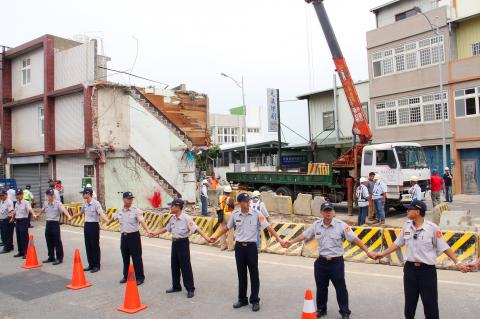
Photo: Peng Chien-li, Taipei Times
Hearing the commotion, Liu looked down from a second-floor balcony, and called the protesters “shameless.”
The quartet were arrested and charged with damaging property.
Chen Wei-ting (陳為廷), a native of Miaoli and a National Tsing Hua University student who was one the protesters, said they wanted Liu to know what it was like to have his house threatened.
The other three protesters were National Taiwan University students.
On Thursday, after the forced demolition in the morning, farming activist Yang Ru-men (楊儒門) and long-time social activist Lee Chien-cheng (李建誠) were arrested at around 6:30pm for trying to throw paint at the Presidential Office in protest at the forced demolition.
Earlier yesterday, Vice President Wu Den-yih (吳敦義) was confronted by a group of students shouting, “You will be punished for breaking promises!” as he attended an award ceremony in Taipei.
Later, in response to media inquiries, Wu he said he was “surprised” by Thursday’s demolition, but insisted it was within the county government’s authority to handle the case.
“I was quite surprised by the county government’s move. However, the county government handled the incident in accordance with the law. How can we overstep our authority and interfere with local affairs?” he said.
Additional reporting by Mo Yan-chih

Two US House of Representatives committees yesterday condemned China’s attempt to orchestrate a crash involving Vice President Hsiao Bi-khim’s (蕭美琴) car when she visited the Czech Republic last year as vice president-elect. Czech local media in March last year reported that a Chinese diplomat had run a red light while following Hsiao’s car from the airport, and Czech intelligence last week told local media that Chinese diplomats and agents had also planned to stage a demonstrative car collision. Hsiao on Saturday shared a Reuters news report on the incident through her account on social media platform X and wrote: “I

‘BUILDING PARTNERSHIPS’: The US military’s aim is to continue to make any potential Chinese invasion more difficult than it already is, US General Ronald Clark said The likelihood of China invading Taiwan without contest is “very, very small” because the Taiwan Strait is under constant surveillance by multiple countries, a US general has said. General Ronald Clark, commanding officer of US Army Pacific (USARPAC), the US Army’s largest service component command, made the remarks during a dialogue hosted on Friday by Washington-based think tank the Center for Strategic and International Studies. Asked by the event host what the Chinese military has learned from its US counterpart over the years, Clark said that the first lesson is that the skill and will of US service members are “unmatched.” The second
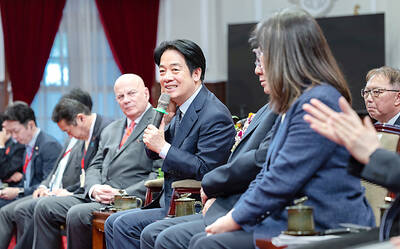
STANDING TOGETHER: Amid China’s increasingly aggressive activities, nations must join forces in detecting and dealing with incursions, a Taiwanese official said Two senior Philippine officials and one former official yesterday attended the Taiwan International Ocean Forum in Taipei, the first high-level visit since the Philippines in April lifted a ban on such travel to Taiwan. The Ocean Affairs Council hosted the two-day event at the National Taiwan University Hospital International Convention Center. Philippine Navy spokesman Rear Admiral Roy Vincent Trinidad, Coast Guard spokesman Grand Commodore Jay Tarriela and former Philippine Presidential Communications Office assistant secretary Michel del Rosario participated in the forum. More than 100 officials, experts and entrepreneurs from 15 nations participated in the forum, which included discussions on countering China’s hybrid warfare
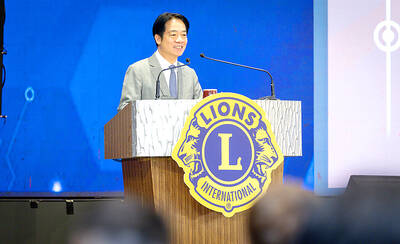
MORE DEMOCRACY: The only solution to Taiwan’s current democratic issues involves more democracy, including Constitutional Court rulings and citizens exercising their civil rights , Lai said The People’s Republic of China (PRC) is not the “motherland” of the Republic of China (ROC) and has never owned Taiwan, President William Lai (賴清德) said yesterday. The speech was the third in a series of 10 that Lai is scheduled to deliver across Taiwan. Taiwan is facing external threats from China, Lai said at a Lions Clubs International banquet in Hsinchu. For example, on June 21 the army detected 12 Chinese aircraft, eight of which entered Taiwanese waters, as well as six Chinese warships that remained in the waters around Taiwan, he said. Beyond military and political intimidation, Taiwan